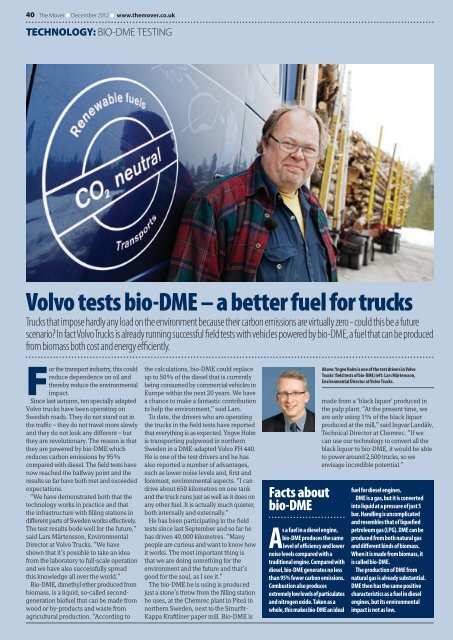The Mover December 2012
The Mover December 2012
The Mover December 2012
Create successful ePaper yourself
Turn your PDF publications into a flip-book with our unique Google optimized e-Paper software.
40 <strong>The</strong> <strong>Mover</strong> ● <strong>December</strong> <strong>2012</strong> ● www.themover.co.ukTECHNOLOGY: BIO-DME TESTINGVolvo tests bio-DME – a better fuel for trucksTrucks that impose hardly any load on the environment because their carbon emissions are virtually zero - could this be a futurescenario? In fact Volvo Trucks is already running successful field tests with vehicles powered by bio-DME, a fuel that can be producedfrom biomass both cost and energy efficiently.For the transport industry, this couldreduce dependence on oil andthereby reduce the environmentalimpact.Since last autumn, ten specially adaptedVolvo trucks have been operating onSwedish roads. <strong>The</strong>y do not stand out inthe traffic – they do not travel more slowlyand they do not look any different – butthey are revolutionary. <strong>The</strong> reason is thatthey are powered by bio-DME whichreduces carbon emissions by 95%compared with diesel. <strong>The</strong> field tests havenow reached the halfway point and theresults so far have both met and exceededexpectations.“We have demonstrated both that thetechnology works in practice and thatthe infrastructure with filling stations indifferent parts of Sweden works effectively.<strong>The</strong> test results bode well for the future,”said Lars Mårtensson, EnvironmentalDirector at Volvo Trucks. “We haveshown that it’s possible to take an ideafrom the laboratory to full-scale operationand we have also successfully spreadthis knowledge all over the world.”Bio-DME, dimethyl ether produced frombiomass, is a liquid, so-called secondgenerationbiofuel that can be made fromwood or by-products and waste fromagricultural production. “According tothe calculations, bio-DME could replaceup to 50% of the diesel that is currentlybeing consumed by commercial vehicles inEurope within the next 20 years. We havea chance to make a fantastic contributionto help the environment,” said Lars.To date, the drivers who are operatingthe trucks in the field tests have reportedthat everything is as expected. Yngve Holmis transporting pulpwood in northernSweden in a DME-adapted Volvo FH 440.He is one of the test drivers and he hasalso reported a number of advantages,such as lower noise levels and, first andforemost, environmental aspects. “I candrive about 650 kilometres on one tankand the truck runs just as well as it does onany other fuel. It is actually much quieter,both internally and externally.”He has been participating in the fieldtests since last September and so far hehas driven 40,000 kilometres. “Manypeople are curious and want to know howit works. <strong>The</strong> most important thing isthat we are doing something for theenvironment and the future and that’sgood for the soul, as I see it.”<strong>The</strong> bio-DME he is using is producedjust a stone’s throw from the filling stationhe uses, at the Chemrec plant in Piteå innorthern Sweden, next to the Smurfit-Kappa Kraftliner paper mill. Bio-DME isFacts aboutbio-DMEAs a fuel in a diesel engine,bio-DME produces the samelevel of efficiency and lowernoise levels compared with atraditional engine. Compared withdiesel, bio-DME generates no lessthan 95% fewer carbon emissions.Combustion also producesextremely low levels of particulatesand nitrogen oxide. Taken as awhole, this makes bio-DME an idealAbove: Yngve Holm is one of the test drivers in VolvoTrucks’ field tests of bio-DME; left: Lars Mårtensson,Environmental Director at Volvo Trucks.made from a ‘black liquor’ produced inthe pulp plant. “At the present time, weare only using 1% of the black liquorproduced at the mill,” said Ingvar Landälv,Technical Director at Chemrec. “If wecan use our technology to convert all theblack liquor to bio-DME, it would be ableto power around 2,500 trucks, so weenvisage incredible potential.”fuel for diesel engines.DME is a gas, but it is convertedinto liquid at a pressure of just 5bar. Handling is uncomplicatedand resembles that of liquefiedpetroleum gas (LPG). DME can beproduced from both natural gasand different kinds of biomass.When it is made from biomass, itis called bio-DME.<strong>The</strong> production of DME fromnatural gas is already substantial.DME then has the same positivecharacteristics as a fuel in dieselengines, but its environmentalimpact is not as low.



